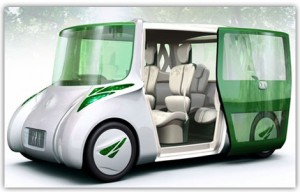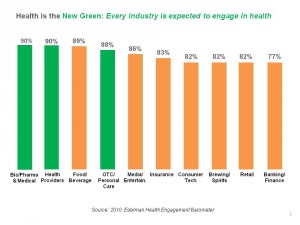 In an interview in March 2011 with the Los Angeles Times, Dr. Regina Benjamin, the U.S. Surgeon General, said, “We can’t look at health in isolation. It’s not just in the doctor’s office. It’s got to be where we live, we work, we play, we pray. If you have a healthy community, you have a healthy individual.”
In an interview in March 2011 with the Los Angeles Times, Dr. Regina Benjamin, the U.S. Surgeon General, said, “We can’t look at health in isolation. It’s not just in the doctor’s office. It’s got to be where we live, we work, we play, we pray. If you have a healthy community, you have a healthy individual.”
Ford’s announcement last week that the automaker would team up with WellDoc to incorporate mobile health sensors into the company’s SYNC connectivity system follows Toyota’s mhealth concept, the RiN, launched in 2007.
Among various applications envisioned at this preliminary stage:
- Glucose monitors, from Medtronic, will connect to SYNC and communicate glucose readings on a Ford car’s vehicle instruments, with alerts warning the driver to undertake an action (e.g., eat, take an oral med, administer insulin).
- For allergy sufferers, SYNC’s GPS system will update pollen levels in the car’s vicinity, which would prompt the car to close windows when levels were sensed to be too high for an asthma sufferer, automatically switching on the auto’s air conditioning.
- WellDoc’s condition management system will link into SYNC and prompt drivers to manage conditions, receive coaching and health educational messages.
Brian Dolan of MobiHealthNews met with Ford and WellDoc to learn about the details of the venture, which we writes about here. The story has gotten a lot of coverage in automotive publications, business blogs, and in the general press. My latest Google search this morning yielded results as far-reaching as Greece, Morocco, Russia. Mobile health interest is indeed global.
 The Independent, one of the UK’s national newspapers, covered the story saying, “Glucose monitoring and pollen readings could soon be in our cars.”
The Independent, one of the UK’s national newspapers, covered the story saying, “Glucose monitoring and pollen readings could soon be in our cars.”
Health Populi’s Hot Points: Getting back to Dr. Benjamin, Ford’s and Toyota’s work on extending the car’s utility into wellness and health fits perfectly into her vision of health care where we live, play, work and pray, 24×7. As the mobile phone has become beloved to those who adopt them, the world over, so are cars to a segment of the population that is drive-happy. Notwithstanding the price of gas, which hovers near $4 a gallon in the U.S. (although dropping a bit this week), Americans continue to fill up their gas tanks even in the post-recession economy. Cars, for some time, will be beloved consumer products, too, and auto makers have spotted the wellness/health opportunity.
 The 2010 Edelman Health Engagement Barometer found that consumers see health as “the new green.” Note from the chart that most people view all industries as having a role to play in their personal health engagement. Automakers are part of the individual’s personal health ecosystem. Ford and Toyota are now riding this train of Whole Health. Watch for all companies to take advantage of health citizens’ growing health engagement.
The 2010 Edelman Health Engagement Barometer found that consumers see health as “the new green.” Note from the chart that most people view all industries as having a role to play in their personal health engagement. Automakers are part of the individual’s personal health ecosystem. Ford and Toyota are now riding this train of Whole Health. Watch for all companies to take advantage of health citizens’ growing health engagement.




 Interviewed live on BNN Bloomberg (Canada) on the market for GLP-1 drugs for weight loss and their impact on both the health care system and consumer goods and services -- notably, food, nutrition, retail health, gyms, and other sectors.
Interviewed live on BNN Bloomberg (Canada) on the market for GLP-1 drugs for weight loss and their impact on both the health care system and consumer goods and services -- notably, food, nutrition, retail health, gyms, and other sectors. Thank you, Feedspot, for
Thank you, Feedspot, for  As you may know, I have been splitting work- and living-time between the U.S. and the E.U., most recently living in and working from Brussels. In the month of September 2024, I'll be splitting time between London and other parts of the U.K., and Italy where I'll be working with clients on consumer health, self-care and home care focused on food-as-medicine, digital health, business and scenario planning for the future...
As you may know, I have been splitting work- and living-time between the U.S. and the E.U., most recently living in and working from Brussels. In the month of September 2024, I'll be splitting time between London and other parts of the U.K., and Italy where I'll be working with clients on consumer health, self-care and home care focused on food-as-medicine, digital health, business and scenario planning for the future...